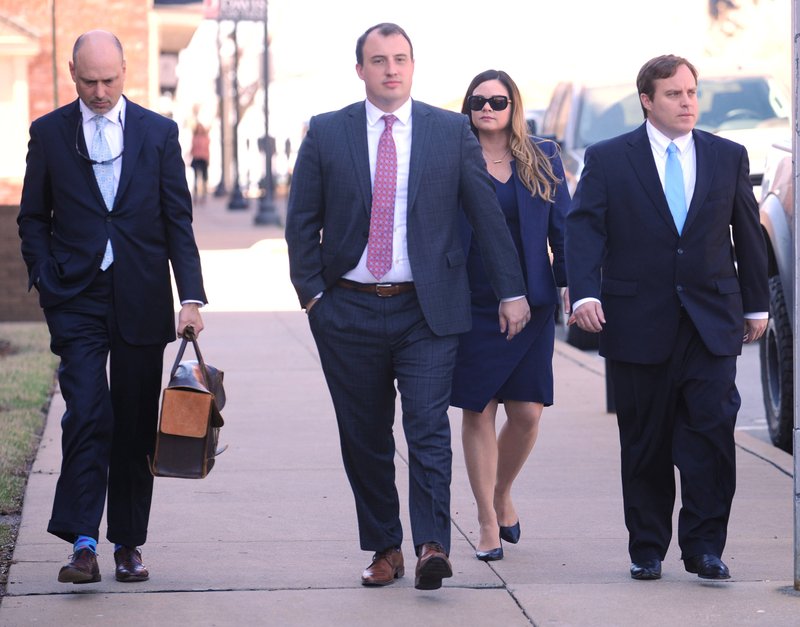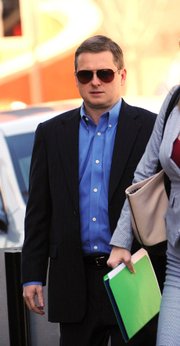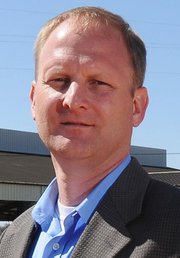The federal government is keeping private much of its core evidence in the public corruption case against former state Sen. Jon Woods and two other men.
The U.S. Attorney's Office in March requested a protection order sealing documents in the case. Their motion cited both the need to protect the defendants' private financial information and "confidential and sensitive information related to other law enforcement investigations. If this information were to be publicly disclosed, such disclosure might impair an ongoing investigation or infringe on the privacy rights of third parties whose conduct is or was at one time under investigation."
TIMELINE
Former state Sen. Jon Woods of Springdale faces fraud charges in a federal indictment. Woods is accused of taking kickbacks from Oren Paris III, president of Ecclesia College in Springdale, in return for directing state grants to the college. Randell Shelton of Alma is accused of being the middle man who passed the bribes to Woods through his consulting firm in return for a share.
Paris and Shelton are also charged with wire fraud. All three are charged with one count of conspiracy to commit fraud. Woods is also charged with one count of money laundering.
Woods faces one count of fraud involving a second nonprofit, a job training program called AmeriWorks. The nonprofit was incorporated by Rusty Cranford, a onetime executive for Decision Point, a Bentonville-based drug treatment program.
The following timeline is based on federal court records, records from the Northwest Arkansas Economic Development District and reporting by the Northwest Arkansas Democrat-Gazette.
2013
• Feb. 18: Woods files and sponsors bill to steer state money to the Northwest Arkansas Development District in Harrison, which would later distribute Improvement Fund grants.
• March 18: Woods votes to OK $2 million disbursement to the development district for improvement fund grants.
• April 22-23: Woods votes to appropriate the $2 million previously OK’d.
• June: Woods tells Rep. Micah Neal, R-Springdale, that Rusty Cranford of AmeriWorks will give 20 percent kickback on improvement fund grants.
• June 26: Cranford emails Decision Point employees telling them to fill out application for AmeriWorks for $250,00 and assuring them it will be approved. Cranford represents Decision Point as a lobbyist.
• July 9: Cranford sends Decision Point employees a revised application increasingy the amount to $400,000.
• July 26: Neal emails development district to say he’s partnering with Woods to give AmeriWorks $400,000.
• Aug. 5: Paris hires a female friend of Woods as an assistant at Ecclesia College to be paid $43,000 in salary and a $4,000 hiring bonus. The college’s improvement fund application is drafted.
• Aug. 7: The college increases the grant amount requested from $105,000 to $130,000. The friend of Woods’ who is hired has her hiring bonus increased to $7,000.
• Aug. 19: Woods texts Paris to increase request to $200,000.
• Sept. 3: Cranford applies to district for $400,000 for AmeriWorks.
• Sept. 22-27: Paris hires Shelton as consultant.
• Sept. 26: Cranford receives $275,000 from Woods and $125,000 from Neal in grants. Checks made out to Decision Point doing business as AmeriWorks.
• Sept. 26: Shelton incorporates Paradigm Consulting.
• Sept. 27: Paris signs grant agreement; pays Shelton $50,000; Shelton opens Paradigm account at bank and deposits $50,000.
• Sept. 30: Checks deposited in AmeriWork’s account.
• October: Cranford pays Woods an undisclosed amount of cash. Woods pays Neal $20,000.
• Oct. 1: Shelton wires $40,000 to Woods’ personal account; Woods withdraws $33,000 and buys a cashier’s check.
• Oct. 3: College deposits $200,000 into its account; Paris gets $25,000 bonus payment from college’s board of directors.
• Oct. 15: Cranford writes check for $16,500 to his consulting business from AmeriWorks account.
2014
• Aug. 13: Federal officials interview Cranford about his dealings with Woods. Cranford returns grant money, saying he couldn’t acquire the necessary facility.
• November: Development district tells Woods and Neal that AmeriWorks returned its grant. They agree to send $200,000 to Ecclesia.
2015
• Feb. 11: Woods files bill, which later becomes law, making millions more in Improvement Fund money available to work study colleges. Ecclesia was the only college in Arkansas that qualified for the money.
• June 2: Paris submits two grant applications for $33,000 and $250,000.
Oct. 23
2016
• April 13: U.S. Attorney’s office subpoenas Northwest Arkansas Development District, AmeriWorks, Cranford and any entities associated with him; also for records of any grants involving Paris and Ecclesia College.
2017
• Jan. 4: Neal pleads guilty to one count of conspiracy to commit fraud.
• January: Cranford replaced as executive director of Arkansas operations for Decision Point and related groups.
• March 1: Woods, Shelton and Paris indicted.
• April 19: U.S. Attorney files revised indictment.
• May 23: Remarks at a pre-trial hearing reveal the federal investigation is still underway and more indictments are expected of other parties before Woods, Paris and Shelton’s Dec. 4 trial.
• Sept. 13: A second revised indictment is filed against Woods, Paris and Shelton, adding a count of conspiracy to commit fraud.
Defense attorneys didn't object at the time nor at their clients' arraignment in May, but the defendants asked the judge to unseal the documents in a motion filed Oct. 3, claiming the secrecy had become a hindrance to preparing a defense.
Their objection was the order was never lifted or amended in the six months after it was issued, said Shelly Hogan Koehler, attorney for one of the defendants and the only one to comment for this story.
"Any document involving discovery is sealed under this order," Koehler said. "I've never seen anything like it."
U.S. District Judge Timothy Brooks denied the motions to unseal documents.
The motions themselves show the added effort required by the protection order. Attorneys have to be careful in wording every court filing and oral argument in court proceedings because they are not allowed to mention what is under seal without violating the court's order. The motions that are publicly available refer to whatever issue they raise in general terms and legal principles only.
Most documents would be released by now with any sensitive information such as personal financial information or names of those under ongoing investigation redacted, Koehler said.
"The stated purpose of the order was that there was an ongoing investigation," she said.
The U.S. attorney's office declined to comment.
Former U.S. Attorney Connor Eldridge could not comment on particulars of this case, but agreed to discuss practices involving sealed records in general. Eldridge was U.S. attorney for the Western District of Arkansas until he ran for the U.S. Senate last year. As U.S. attorney, he oversaw the investigation that led to the indictment of Woods and others.
"It's definitely unusual to have this much under seal this close to trial, but it is at the judge's discretion on whether it is needed to protect the integrity of the case," Eldridge said. "The fact these seals are still in place show that the government has made a strong showing of the need for it."
Woods, along with co-defendants Oren Paris III and Randell Shelton Jr., are set for trial Dec. 4. A pretrial hearing is scheduled for Thursday.
Woods received kickbacks, according to his indictment, in a plan with Paris and Shelton involving state grants from the General Improvement Fund. Woods faces 15 counts of fraud, all relating to either wire or mail transfers of money. Paris and Shelton are named in 14 of the fraud charges. All three are charged with one count of conspiracy to commit fraud. Woods is also charged with one count of money laundering in connection with the purchase of a cashier's check.
One example of how tight the secrecy remains as the trial approaches is the indictment itself. Woods, R-Springdale, is accused of receiving kickbacks from a college that hasn't been named publicly in court documents for this case.
Paris, the president of Ecclesia College in Springdale, is Woods' co-defendant along with Ecclesia consultant Randell Shelton Jr., who once lived on Ecclesia property. The description of the college benefiting from the grants Woods helped provide fits every detail of Ecclesia, a small, private Christian college. Some of those details, including membership in a national association of work-study colleges, are unique in Arkansas to Ecclesia. One of the defense attorneys in the case mentioned Ecclesia by name in at least one court hearing. In a separate, civil lawsuit against Ecclesia, attorneys for the college told the court it has handed over documents sought by the plaintiff suing the school to its attorney in the federal criminal case.
Yet federal court documents naming the college -- and other details with much fewer clues -- remain under seal, court records show.
One of the charges against Woods claims he and former state Rep. Micah Neal, R-Springdale, also received kickbacks from a nonprofit entity with the stated purpose of job training. Neither the business nor the businessman leading it have been named in court documents that are not under seal. The indictment refers to the business as Entity C and the businessman as Businessman A.
ONGOING INVESTIGATION
Freedom of Information Act requests by the Northwest Arkansas Democrat-Gazette in January found at least three of the state's eight economic development districts, which administered the General Improvement Fund grants, had been subpoenaed by federal investigators. Another development district would not confirm nor deny whether it had.
Since that time, staff for the state Legislature obtained permission to hire outside legal counsel to represent them in dealing with federal investigators who have requested more records relating to the improvement fund grants. The records include state legislators' working papers.
"The most common reason something remains under seal is to protect the integrity of an investigation still in progress, but there are other reasons," Eldridge said. "For instance, there would be a lot of generally sensitive information that could appear to implicate people who, once the matter's investigation, will never be charged."
Many of those people are witnesses and some are victims, he said.
"Even in cases where the U.S. attorney sought an indictment and failed to get one from the grand jury, those people have a right to privacy," he said.
Laurent Sacharoff, associate professor at the University of Arkansas School of Law in Fayetteville, reviewed the record of the filings in the Woods case on Nov. 14 at the request of the Northwest Arkansas Democrat-Gazette.
"This case involves clear public interest, including allegations that public officials took bribes. In such a case, it strikes me that documents should be filed under seal only after carefully weighing the need for particular information to remain secret as against this strong public interest in transparency. Sometimes, a court can redact sensitive information rather than filing an entire document under seal."
Sacharoff noted the U.S. Court of Appeals for the 8th Circuit ruling in the case of IDT Corp. vs. eBay, a patent infringement case. Although the Woods trial involves criminal allegations, the appeals court ruling directly addresses the issue of sealing an entire record to protect confidential information compared to redacting such information while leaving the rest of the record open, he said.
The court ruled judicial records should remain open unless the trial court can give a clear and compelling reason for closing the entire record. This is a principle of common law that precedes the U.S. Constitution and its First Amendment, the court ruled. The 8th Circuit's multistate district includes Arkansas, so the court's standard applies here, Sacharoff said.
At least 23 files remain sealed among the 204 documents filed in the case against Woods, Paris and Shelton, a review of filings shows. Four sealed documents were filed Nov. 15 alone, the listing shows. Another five were filed Nov. 17.
The files entered in the case are numbered sequentially, from 1 to 204. However, at least six file numbers are missing from the public listing of that sequence, court records show: entries 60, 61, 120, 122, 124 and 125.
There is no indication of what the sealed documents are. They could be motions, subpoenas or simply bank records that include the defendants' Social Security numbers. All are protected under the March court order.
THE CASE ITSELF
Woods' indictment occurred just weeks after Neal pleaded guilty Jan. 4 to one count of conspiracy to commit fraud, admitting he took two kickbacks totaling $38,000 in exchange for directing improvement fund grants to two nonprofit groups. He has not been sentenced.
The indictment does not give a total figure of what Woods is accused of receiving in kickbacks because portions of it were allegedly paid in cash, the indictment alleges.
Neal's plea and the indictment involve grants from the Improvement Fund, which was controlled by legislators. The fund consists of state tax money left unallocated at the end of each fiscal year and interest earned on state deposits. Each legislator was given a share of the fund to be directed to nonprofit groups or government entities. Grant funds were awarded by local economic development districts, which followed the wishes of state legislators.
The state Supreme Court declared the entire system of distributing the grants illegal in an October ruling. The high court's 5-2 decision said the appropriation laws that directed the money's disbursement violated the state constitution's Article 5, Section 29. That section says that the purpose of legislative appropriations must be "distinctly stated."
Woods and Neal both announced they were not running for re-election before their charges became public.
The indictment alleges Paris paid Woods and Neal kickbacks in return for a total of $550,000 in grants from those two legislators to his college from 2013 through 2014.
Ecclesia also received Improvement Fund grants from other lawmakers who are not implicated in the indictments, grant records show. In all, the college received $717,500 in grants from 2013 through 2014.
The defense has said in hearings that the grants were sought properly and awarded properly, and denied any kickback arrangement was ever in place. Paris sought grants, Woods supported grant applications and Shelton consulted all in accordance with the law, the defense maintains.
Paris has said through attorneys that he is eager for trial and has objected to co-defendants' motions to delay it. He also objected to being tried along with Woods in a case that brings allegations of kickbacks involving the work training program, which is unrelated to Paris' case.
The judge denied defense requests for separate trials.
INTO THE LIGHT
In some instances, the public learns of evidence in the case only after a judge has ruled on a sealed motion. Woods asked in a motion filed under seal for a hearing on secret recordings of telephone calls made by Neal. The motion sought to keep prosecutors from using the recordings at his trial.
According to the defense motion: "In an audio recording made surreptitiously of a subsequent conversation between Jon Woods and Arkansas state Representative Micah Neal by Mr. Neal, Mr. Woods discussed the somewhat less than harmonious circumstances under which he gave his Nov. 11, 2015, testimony to the government."
Neal recorded this and other conversations on his own, without the direction of federal investigators according to the government's response to the motion.
The motion became public Sept. 8 when Brooks denied it.
In another motion, the defense protested that they received much of the evidence in an unusable form of computer files, format and storage. The judge overruled objections about the form of electronic records, saying that commercially available software would have fixed the problem and that the U.S. attorney told the defense what software to get.
A motion by Woods' attorney to delay the trial date is also before the court. That motion is opposed by Paris' attorneys.
All three defendants have entered innocent pleas. They were first indicted on March 3 with a superseding indictment filed April 18 and a second superseding indictment filed Sept. 13.
The three defendants face up to 20 years in prison on the fraud and conspiracy charges, if convicted. Woods faces an additional 10 years on the money laundering charge, if convicted.
All three may also be ordered to forfeit any money or property obtained through their actions, if found guilty.
Woods and Neal also took kickbacks from another nonprofit group, a workforce training program that returned $400,000 in grants after being questioned by federal investigators, according to the indictment. Both the indictment and Neal's guilty plea say the two lawmakers cooperated in the workforce grants in return for kickbacks.
The indictment states the workforce training program returned the grants in 2013. Grant records and a state audit show the only workforce training program to receive and then return $400,000 in 2013 was a Bentonville company called AmeriWorks.
AmeriWorks was incorporated by Milton "Rusty" Cranford of Rogers, a lobbyist who represented Decision Point, a Bentonville-based nonprofit corporation that provides behavioral and substance abuse treatment. Decision Point staff helped file the grant and the organization received the grants on AmeriWorks' behalf, with Cranford signing the application for the grants in question, according to state records and court documents.
NW News on 11/26/2017



